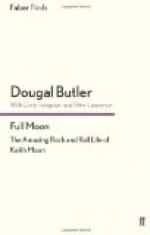It seemed incredible, almost impossible. Death at such a moment assumed an unexpected reality as an actual and tangible mocker of human ambitions. And this letter with its postscript—what was the meaning of it? The lawyer knew nothing of Robert Turold’s announcement to his family on the previous day. If he had, it would have intensified his feeling that the letter hinted at some terrible secret hidden behind the thick curtain of his client’s strange and sudden death. The hasty postscript suggested a quickened sense of a growing danger which Robert Turold had seen too late to avert.
What danger? Mr. Brimsdown could form no idea. He reflected that he really knew very little of Robert Turold’s private life in spite of the long association between them. He must have had other interests at one time or other beside the eternal question of the title. Mr. Brimsdown had vaguely understood that the money he had invested for Robert Turold had been gained abroad—in the wilds of the earth—in his client’s early life, but his client had never confided to him the manner of the gathering. That was a page in the dead man’s life of which his trusted legal adviser knew nothing whatever. It was unsafe to assume that the page, if revealed, would throw any light on his tragic death, but there was a possibility that it might.
The evening newspaper he had brought home lay on the carpet at his feet exposing the headline—“A Cornish Mystery”—which had caught his eye at the restaurant. Mr. Brimsdown picked up the sheet and read the report again. There was nothing in it to help him. It was only a brief notification of the facts—of a death which, in the words of the newspaper’s local correspondent, “pointed to suicide.”
Suicide! The letter on which the ink was still bluish and fresh, seemed to convey Robert Turold’s denial of the suggestion that he had taken his life. It was the cry of a man who had looked into the dark place of fear and seen Death lurking within. Only mortal terror could have called forth that passionate frantic appeal. And that appeal accomplished its purpose, although it came too late. Robert Turold was dead, but the call for elucidation rang loudly from his coffin. The dead man’s hand beckoned him, and he dared not disobey. He determined to go to Cornwall.
Outside in the darkness a clock chimed, and one of his own treasures repeated the hour with a soft mellifluous note. Eleven! He had an idea that there was—or used to be—a midnight train to Cornwall. He crossed to his bureau and consulted a time-table. Yes—to Penzance from Paddington. He decided to catch it.
His preparations for departure were quickly made. The writing of a note to his clerk and the packing of a bag were matters soon accomplished. In a quarter of an hour he had picked up a taxicab at the Holborn stand near his chambers and was on his way to the station.




